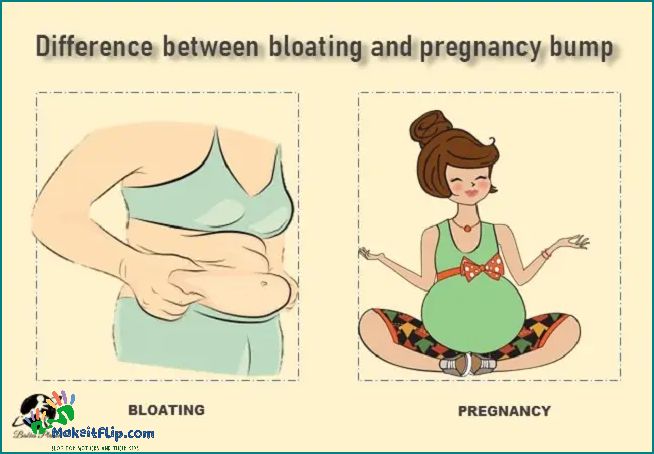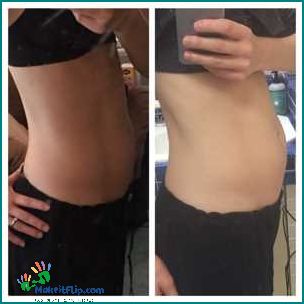Contents
Understanding the difference between bloating and pregnancy: what you need to know

Bloating and pregnancy are two common experiences that many women go through. However, it’s important to understand the difference between the two in order to avoid confusion and unnecessary worry. While bloating is a temporary condition that affects the digestive system, pregnancy is a life-changing event that involves the growth of a baby inside the womb.
Bloating is often caused by factors such as overeating, gas, or hormonal changes. It is characterized by a feeling of fullness, discomfort, and a swollen abdomen. On the other hand, pregnancy is a natural process in which a fertilized egg implants itself in the uterus and develops into a fetus. It is accompanied by various symptoms such as missed periods, breast tenderness, and morning sickness.
It’s worth noting that bloating can sometimes be a symptom of early pregnancy. This can lead to confusion, especially for women who are trying to conceive. However, there are certain signs that can help differentiate between the two. For example, bloating is often accompanied by other digestive issues such as constipation or diarrhea, while pregnancy symptoms are more focused on the reproductive system.
If you’re experiencing bloating and are unsure whether it’s related to pregnancy or not, it’s always best to consult a healthcare professional. They can provide you with the necessary guidance and support to determine the cause of your symptoms. Remember, understanding the difference between bloating and pregnancy is key to maintaining your physical and emotional well-being.
What is bloating?

Bloating is a common condition that many people experience. It refers to the feeling of fullness or tightness in the abdomen, often accompanied by an increase in the size of the abdomen. Bloating can be caused by a variety of factors, including gas, indigestion, constipation, and water retention.
When bloating occurs, the abdomen may feel swollen or distended, and there may be discomfort or pain. It can also be accompanied by other symptoms such as burping, flatulence, and a feeling of heaviness.
Bloating is different from pregnancy, as it is not caused by the growth of a baby. It is a temporary condition that can be relieved by making certain lifestyle changes, such as avoiding foods that cause gas, eating smaller meals, and staying hydrated.
In some cases, bloating may be a symptom of an underlying medical condition, such as irritable bowel syndrome (IBS) or gastroesophageal reflux disease (GERD). If bloating is persistent or accompanied by other concerning symptoms, it is important to consult a healthcare professional for further evaluation and diagnosis.
| Bloating | Pregnancy |
|---|---|
| Temporary condition | Long-term condition |
| Caused by factors such as gas, indigestion, constipation, and water retention | Caused by the growth of a baby |
| Can be relieved by lifestyle changes | Requires prenatal care and management |
| May be a symptom of an underlying medical condition | N/A |
Causes of bloating

Bloating can be caused by a variety of factors, including:
- Excessive gas production in the digestive system
- Swallowing air while eating or drinking
- Consuming gas-producing foods and drinks, such as beans, lentils, carbonated beverages, and certain vegetables
- Food intolerances or sensitivities, such as lactose or gluten intolerance
- Constipation or slow digestion
- Overeating or eating too quickly
- Stress and anxiety
- Hormonal changes
- Certain medications
It is important to identify the underlying cause of bloating in order to effectively manage and prevent it. If bloating persists or is accompanied by other concerning symptoms, it is recommended to consult a healthcare professional for further evaluation.
Symptoms of bloating

Bloating is a common condition that can cause discomfort and a feeling of fullness in the abdomen. It is often accompanied by other symptoms such as gas, burping, and stomach cramps.
Some common symptoms of bloating include:
- Feeling full or swollen in the abdomen
- Excessive gas and burping
- Abdominal pain or cramps
- Feeling bloated after eating
- Increased flatulence
- Changes in bowel movements, such as constipation or diarrhea
- Feeling uncomfortable or heavy in the stomach
It is important to note that bloating can be caused by a variety of factors, including diet, lifestyle, and certain medical conditions. If you are experiencing persistent or severe bloating, it is recommended to consult with a healthcare professional for proper diagnosis and treatment.
What is pregnancy?

Pregnancy is a natural process in which a woman’s body undergoes significant changes to support the growth and development of a baby. It occurs when a sperm fertilizes an egg, resulting in the formation of a zygote that implants itself in the uterus. The fertilized egg then develops into an embryo and later a fetus, which grows and develops inside the woman’s uterus.
During pregnancy, the woman’s body goes through various hormonal and physical changes to accommodate the growing baby. These changes can include weight gain, increased blood volume, changes in hormone levels, and expansion of the uterus. These changes are necessary to provide the necessary nutrients and oxygen to the developing baby and to prepare the body for childbirth.
It is important to note that pregnancy is different from bloating. Bloating is a temporary condition that is caused by excess gas or fluid in the digestive system. It can cause discomfort and a feeling of fullness in the abdomen, but it is not related to the growth of a baby. Bloating can be caused by various factors such as overeating, eating certain foods, or digestive disorders.
In contrast, pregnancy is a complex and miraculous process that involves the creation of new life. It is a time of excitement, anticipation, and preparation for the arrival of a baby. Throughout pregnancy, women may experience a range of physical and emotional changes, and it is important to seek medical care and support to ensure a healthy and successful pregnancy.
| Bloating | Pregnancy |
| Temporary condition | Natural process |
| Caused by excess gas or fluid in the digestive system | Caused by the fertilization of an egg and the growth of a baby |
| Not related to the growth of a baby | Involves significant changes in the woman’s body to support the growth and development of a baby |
Signs of pregnancy

When it comes to determining whether you are experiencing bloating or pregnancy, there are several signs to look out for. While bloating is a common symptom that can occur for various reasons, pregnancy has its own unique set of signs that can help differentiate between the two.
- Missed period: One of the most obvious signs of pregnancy is a missed period. If your menstrual cycle is usually regular and you have missed your period, it could be a strong indication of pregnancy.
- Breast changes: Pregnancy can cause changes in your breasts, such as tenderness, swelling, or darkening of the nipples. These changes are often one of the early signs of pregnancy.
- Nausea and vomiting: Morning sickness is a common symptom of pregnancy, although it can occur at any time of the day. If you are experiencing frequent nausea and vomiting, it could be a sign that you are pregnant.
- Frequent urination: Pregnancy can cause an increase in the frequency of urination. If you find yourself needing to urinate more often than usual, it could be a sign of pregnancy.
- Fatigue: Feeling tired or exhausted is another common sign of pregnancy. Hormonal changes and increased blood production can contribute to feelings of fatigue during pregnancy.
- Food cravings or aversions: Pregnancy can cause changes in your taste preferences, leading to cravings for certain foods or aversions to others. If you find yourself craving unusual foods or being repulsed by foods you used to enjoy, it could be a sign of pregnancy.
If you are experiencing several of these signs and suspect that you may be pregnant, it is important to take a pregnancy test or consult with a healthcare professional for confirmation. Remember, every pregnancy is different, and not all women will experience the same signs or symptoms.
FAQ about topic Bloating versus pregnancy Understanding the difference
What is bloating?
Bloating is a condition characterized by a feeling of fullness and tightness in the abdomen. It is usually caused by excess gas or fluid in the digestive system.
How can I differentiate between bloating and pregnancy?
Bloating and pregnancy can have similar symptoms, such as a swollen abdomen and discomfort. However, pregnancy is characterized by missed periods, breast changes, and positive pregnancy tests, while bloating is not.
Can bloating be a sign of pregnancy?
Bloating can be a symptom of pregnancy, but it is not a definitive sign. Other pregnancy symptoms, such as missed periods and positive pregnancy tests, are more reliable indicators.
What are the common causes of bloating?
Common causes of bloating include overeating, eating too quickly, consuming gas-producing foods, and digestive disorders such as irritable bowel syndrome (IBS) or lactose intolerance.
How can I relieve bloating?
To relieve bloating, you can try eating smaller meals, avoiding gas-producing foods, drinking plenty of water, exercising regularly, and taking over-the-counter medications such as simethicone. If bloating persists or is accompanied by severe pain, it is important to consult a healthcare professional.
I’m Diana Ricciardi, the author behind Makeitflip.com. My blog is a dedicated space for mothers and their kids, where I share valuable insights, tips, and information to make parenting a bit easier and more enjoyable.
From finding the best booster seat high chair for your child, understanding the connection between sciatica and hip pain, to exploring the benefits of pooping in relieving acid reflux, I cover a range of topics that are essential for every parent.
My goal is to provide you with practical advice and solutions that you can easily incorporate into your daily life, ensuring that you and your child have the best possible experience during these precious years.
